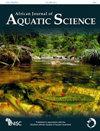Habitat structure differentially mitigates predation impact of juvenile largemouth bass and Florida bass
IF 1
4区 环境科学与生态学
Q3 MARINE & FRESHWATER BIOLOGY
引用次数: 0
Abstract
Habitat complexity plays an important role in structuring species diversity, behaviour and distribution. Furthermore, habitat complexity can mediate the strength of predator-prey interactions through the provision of prey refugia or through enhancing ambush predation. In this study, we use functional responses (FRs) to compare the effect of habitat complexity on resource utilisation between Largemouth Bass Micropterus salmoides and Florida Bass Micropterus floridanus predating upon Mozambique Tilapia Oreochromis mossambicus fry. Treatments for this study were zero and high habitat complexities, with the latter being artificially constructed using plastic strips. Both predator species exhibited a Type II FR in both habitat complexities, with Florida Bass exhibiting significantly higher FR magnitudes, compared with Largemouth Bass under both habitat complexities. Both species experienced dampening of FR magnitudes under high habitat complexity. Florida Bass had persistently lower handling parameters than Largemouth Bass regardless of habitat complexity. While higher habitat complexity may offer prey refugia from Florida Bass, changes in complexity had a negligible effect upon Largemouth Bass predatory efficiency. Measures to enhance natural complexity through system restoration may be a useful conservation measure for endemic fish in rivers invaded by Florida Bass, however, the same mitigation measures may not be as effective for Largemouth Bass.生境结构对大口黑鲈幼鱼和佛罗里达黑鲈的捕食影响有不同的缓解作用
生境复杂性在构建物种多样性、行为和分布方面发挥着重要作用。此外,栖息地的复杂性可以通过提供猎物避难所或加强伏击捕食来调节捕食者与猎物相互作用的强度。在这项研究中,我们使用功能反应(FR)来比较栖息地复杂性对资源利用的影响,这两种栖息地是Largemouth Bass Micropterus salmoides和Florida Bass Microterus floridanus,它们捕食莫桑比克罗非鱼。这项研究的处理方法是零和高栖息地复杂性,后者是用塑料条人工建造的。两种捕食者在两种栖息地复杂性下都表现出II型FR,与Largemouth Bass相比,在两种生境复杂性下,Florida Bass表现出明显更高的FR等级。在栖息地高度复杂的情况下,这两个物种都经历了FR幅度的减弱。无论栖息地的复杂性如何,佛罗里达鲈鱼的处理参数始终低于Largemouth鲈鱼。虽然更高的栖息地复杂性可能会为佛罗里达鲈鱼提供猎物避难所,但复杂性的变化对Largemouth Bass的捕食效率的影响微乎其微。通过系统恢复来提高自然复杂性的措施可能是佛罗里达巴斯入侵河流中特有鱼类的有用保护措施,然而,同样的缓解措施可能对Largemouth Bass没有那么有效。
本文章由计算机程序翻译,如有差异,请以英文原文为准。
求助全文
约1分钟内获得全文
求助全文
来源期刊

African Journal of Aquatic Science
MARINE & FRESHWATER BIOLOGY-
CiteScore
3.90
自引率
7.10%
发文量
31
审稿时长
>12 weeks
期刊介绍:
The African Journal of Aquatic Science is an international journal devoted to the study of the aquatic sciences, covering all African inland and estuarine waters. The Journal publishes peer-reviewed original scientific papers and short articles in all the aquatic science fields including limnology, hydrobiology, ecology, conservation, biomonitoring, management, water quality, ecotoxicology, biological interactions, physical properties and human impacts on African aquatic systems.
 求助内容:
求助内容: 应助结果提醒方式:
应助结果提醒方式:


